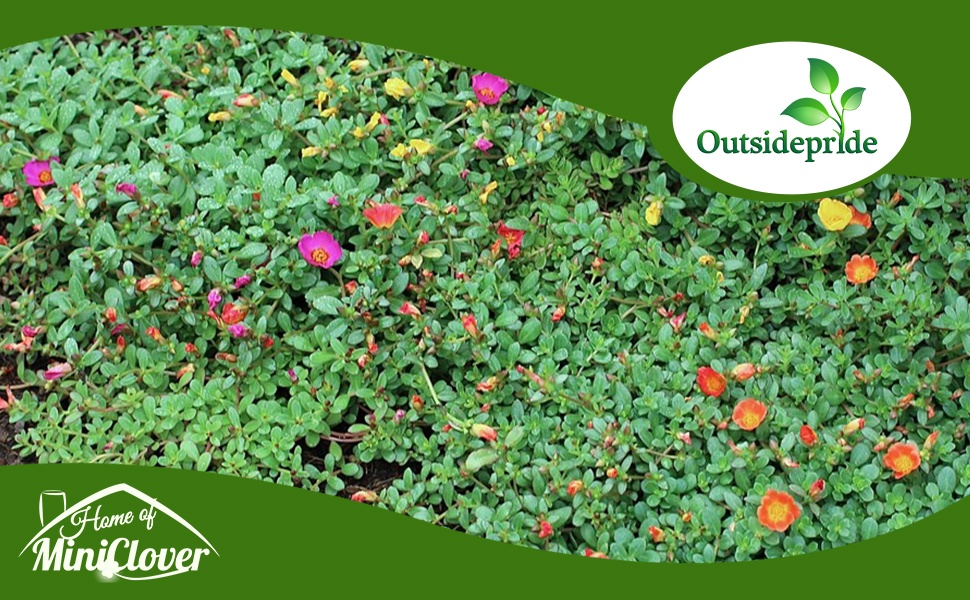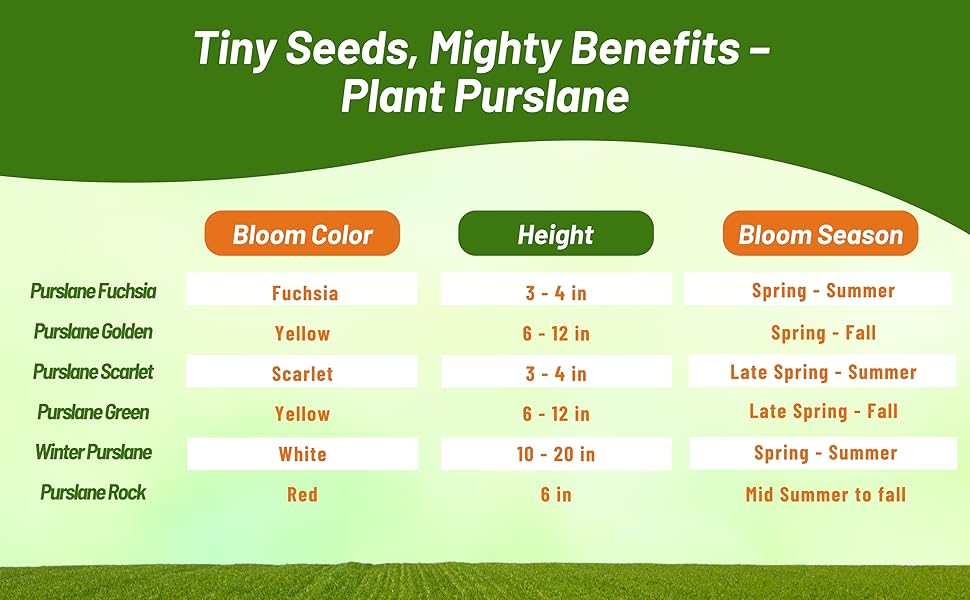-
CATEGORY ::
- All Seeds /
- All Ground Cover Seeds /
- All Moss Rose Seeds










Moss Rose Seeds - Sundial Mix
SEASON
Annual
USDA ZONES
4 - 11
HEIGHT
5 inches
WIDTH
6 - 8 inches
BLOOM SEASON
Summer
BLOOM COLOR
Mix
GROWTH RATE
Aggressive
ENVIRONMENT
Full sun
DEER RESISTANT
Yes
SEASON
Annual
USDA ZONES
4 - 11
HEIGHT
6 inches
WIDTH
14 - 16 inches
BLOOM SEASON
Early summer to late summer
BLOOM COLOR
Mix
GROWTH RATE
Aggressive
ENVIRONMENT
Full sun
DEER RESISTANT
Yes
SOIL TYPE
Well-drained, dry, pH 6.1 - 7.5
SEASON
Annual
USDA ZONES
4 - 11
HEIGHT
6 inches
WIDTH
14 - 16 inches
BLOOM SEASON
Early summer to late summer
BLOOM COLOR
Yellow
GROWTH RATE
Aggressive
ENVIRONMENT
Full sun
DEER RESISTANT
Yes
SOIL TYPE
Well-drained, dry, pH 6.1 - 7.5
SEASON
Annual
USDA ZONES
4 - 11
HEIGHT
6 inches
WIDTH
14 - 16 inches
BLOOM SEASON
Early summer to late summer
BLOOM COLOR
Deep red
GROWTH RATE
Aggressive
ENVIRONMENT
Full sun
DEER RESISTANT
Yes
SOIL TYPE
Well-drained, dry, pH 6.1 - 7.5
SEASON
Annual
USDA ZONES
4 - 11
HEIGHT
6 inches
WIDTH
14 - 16 inches
BLOOM SEASON
Early summer to late summer
BLOOM COLOR
Pink
GROWTH RATE
Aggressive
ENVIRONMENT
Full sun
DEER RESISTANT
Yes
SOIL TYPE
Well-drained, dry, pH 6.1 - 7.5
SEASON
Annual
USDA ZONES
4 - 11
HEIGHT
6 inches
WIDTH
14 - 16 inches
BLOOM SEASON
Early summer to late summer
BLOOM COLOR
White
GROWTH RATE
Aggressive
ENVIRONMENT
Full sun
DEER RESISTANT
Yes
SOIL TYPE
Well-drained, dry, pH 6.1 - 7.5
SEASON
Annual
USDA ZONES
4 - 11
HEIGHT
6 Inches
WIDTH
14 - 16 inches
BLOOM SEASON
Early summer to late summer
BLOOM COLOR
Orange
GROWTH RATE
Aggressive
ENVIRONMENT
Full sun
DEER RESISTANT
Yes
SOIL TYPE
Well-drained, dry, pH 6.1 - 7.5
SEASON
Annual
USDA ZONES
3 - 10
HEIGHT
3 - 4 inches
BLOOM SEASON
Late spring to late summer
BLOOM COLOR
Scarlet
ENVIRONMENT
Full sun
SOIL TYPE
Well drained, loamy, pH 5.8 - 6.2
DEER RESISTANT
Yes
About...
Moss Rose (Portulaca Grandiflora Sundial Mix) - Excellent garden performer for hot, dry, full sun conditions. These Portulaca flowers nearly glow on top the green, succulent foliage! Moss Rose works well as a ground cover plant, growing only 5 inches tall and spreading 6 - 8 inches in width.MORE MOSS ROSE OPTIONS
Planting Directions
TEMPERATURE
70 - 80F
AVERAGE GERM TIME
7 - 14 days
LIGHT REQUIRED
Yes
DEPTH
Press gently into soil but do not cover
SOIL TYPE
Well-drained, dry, pH 5.5 - 6.2
SOWING RATE
Approximately 1000 Moss Rose seeds covers 20 square feet
MOISTURE
Keep soil slightly moist, but not wet until germination





Moss Rose (Portulaca Grandiflora Sundial Mix) - Excellent garden performer for hot, dry, full sun conditions. These Portulaca flowers nearly glow on top the green, succulent foliage! Moss Rose works well as a ground cover plant, growing only 5 inches tall and spreading 6 - 8 inches in width. It fills in those areas of the garden that are troublesome as it is a very tolerant plant. This moss rose mix thrives in sunny hot locations where the soil is poor. When it is thriving, it produces lots of flowers with semi-double blooms in intense, vivid colors. There are very few plants that can spread like Moss Rose ground cover in such hot, dry locations.
Sow Moss Rose ground cover seed in starter trays or individual pots 6 - 8 weeks before end of frost season. Press the Moss Rose seeds into the soil but do not cover. The ground cover seed needs light to germinate. Transplant the orange Moss Rose seedlings into the garden 12 inches apart. Portulaca seeds can also be directly sown in prepared soil outdoors after all danger of frost. Portulaca Moss Rose ground cover plants tolerate heat and drought, but they do look best with occasional watering. Moss Rose plant care includes cutting back the plants during the summer to help them stay neat and to extend their blooms into fall.
Common Questions
How are plants commonly used in a landscape?
Moss rose is great for the front of borders, rock gardens, naturalized areas, ground cover, sprawling over rock walls and is great for containers and hanging baskets.
Do I need to deadhead spent blooms?
To reduce self-seeding, you will want to deadhead spent blooms.
Do I need to fertilizer plants?
Plants are quite resilient and can thrive in poor soil, which means they usually do not require fertilizer. However, applying a balanced, slow-release fertilizer when planting can encourage robust growth and abundant flowering. You can fertilize twice during the growing season using a phosphorus-rich blend to enhance bloom production.
Do I need to prune my plants back?
Require minimal pruning, particularly if you reside in a climate where they thrive year-round. The ideal time for trimming is early spring, just before new growth starts to appear. Be sure to eliminate any dead or diseased growth. Additionally, thinning out a dense plant can enhance air circulation, helping to lower the chances of fungal diseases.
I have very few blooms, what is wrong?
This is almost always a sign of the moisture level. Plants really dislike wet or soggy soil, well-draining soil is needed for moss rose to bloom optimally. Plants also need plenty of light so if your area gets shade, it can make a huge difference to move plants to a new location.
Planting Directions
TEMPERATURE
70 - 80F
AVERAGE GERM TIME
7 - 14 days
LIGHT REQUIRED
Yes
DEPTH
Press gently into soil but do not cover
SOWING RATE
Approximately 1000 Moss Rose seeds covers 20 square feet
MOISTURE
Keep soil slightly moist, but not wet until germination
PLANT SPACING
12 - 15 inches
NOTE
For detailed directions for indoor and outdoor planting, please ...more For detailed directions for indoor and outdoor planting, please Click Here...less
CARE & MAINTENANCE
Moss Rose...less





Moss Rose (Portulaca Grandiflora Mix) - Moss Rose seeds establish easily and produce the perfect ground cover plants for an eye-catching display of long-lasting, tropical color. Portulaca Moss Rose works well in hot, dry garden spots. This mix of Portulaca seeds offers a collection of some of the most intense, colorful blooms you will ever see! The 2-inch flowers on these ground cover plants are fully double and beautifully shaped. The blooms stay opened for long periods of time, and they are nestled above the succulent foliage like shrub roses.
Common Questions
How are plants commonly used in a landscape?
Moss rose is great for the front of borders, rock gardens, naturalized areas, ground cover, sprawling over rock walls and is great for containers and hanging baskets.
Do I need to deadhead spent blooms?
To reduce self-seeding, you will want to deadhead spent blooms.
Do I need to fertilizer plants?
Plants are quite resilient and can thrive in poor soil, which means they usually do not require fertilizer. However, applying a balanced, slow-release fertilizer when planting can encourage robust growth and abundant flowering. You can fertilize twice during the growing season using a phosphorus-rich blend to enhance bloom production.
Do I need to prune my plants back?
Require minimal pruning, particularly if you reside in a climate where they thrive year-round. The ideal time for trimming is early spring, just before new growth starts to appear. Be sure to eliminate any dead or diseased growth. Additionally, thinning out a dense plant can enhance air circulation, helping to lower the chances of fungal diseases.
I have very few blooms, what is wrong?
This is almost always a sign of the moisture level. Plants really dislike wet or soggy soil, well-draining soil is needed for moss rose to bloom optimally. Plants also need plenty of light so if your area gets shade, it can make a huge difference to move plants to a new location.
Planting Directions
TEMPERATURE
70 - 80F
AVERAGE GERM TIME
7 - 14 days
LIGHT REQUIRED
Yes
DEPTH
Press gently into soil but do not cover
SOWING RATE
Approximately 1000 Moss Rose seeds covers 20 square feet
MOISTURE
Keep soil slightly moist, but not wet until germination
PLANT SPACING
12 - 15 inches
CARE & MAINTENANCE
Moss Rose...less





Moss Rose (Portulaca Grandiflora Yellow) - The Moss Rose is a drought tolerant ground cover plant that many gardeners will turn to for the hottest, driest, most problematic spots in the garden, and it establishes nicely from Moss Rose seeds. This 6 inch tall Portulaca plant is a succulent that thrives in heat, drought, and lousy soil. It rewards gardeners with nonstop color. Yellow Portulaca ground cover looks at home in a sun-drenched area of the flower garden, a rock garden, or in containers. Portulaca Moss Rose plants often reseed themselves, coming back the next growing season with the same vivid color and beauty. Perfect for xeriscaping.
Sow Moss Rose seeds in starter trays or individual pots 6 - 8 weeks before end of frost season. Press the ground cover seed into the soil but do not cover. The seeds need light to germinate. Transplant the Moss Rose seedlings into the garden 12 inches apart. Portulaca ground cover seeds can also be directly sown in prepared soil outdoors after all danger of frost. Moss Rose ground cover plants tolerate heat and drought, but they do look best with occasional watering. Portulaca Moss Rose care includes cutting back the plants during the summer to help them to stay neat and to extend their blooms into fall.
Common Questions
How are plants commonly used in a landscape?
Moss rose is great for the front of borders, rock gardens, naturalized areas, ground cover, sprawling over rock walls and is great for containers and hanging baskets.
Do I need to deadhead spent blooms?
To reduce self-seeding, you will want to deadhead spent blooms.
Do I need to fertilizer plants?
Plants are quite resilient and can thrive in poor soil, which means they usually do not require fertilizer. However, applying a balanced, slow-release fertilizer when planting can encourage robust growth and abundant flowering. You can fertilize twice during the growing season using a phosphorus-rich blend to enhance bloom production.
Do I need to prune my plants back?
Require minimal pruning, particularly if you reside in a climate where they thrive year-round. The ideal time for trimming is early spring, just before new growth starts to appear. Be sure to eliminate any dead or diseased growth. Additionally, thinning out a dense plant can enhance air circulation, helping to lower the chances of fungal diseases.
I have very few blooms, what is wrong?
This is almost always a sign of the moisture level. Plants really dislike wet or soggy soil, well-draining soil is needed for moss rose to bloom optimally. Plants also need plenty of light so if your area gets shade, it can make a huge difference to move plants to a new location.
Planting Directions
TEMPERATURE
70 - 80F
AVERAGE GERM TIME
7 - 14 days
LIGHT REQUIRED
Yes
DEPTH
Press gently into soil but do not cover
SOWING RATE
Approximately 1000 Moss Rose seeds covers 20 square feet
MOISTURE
Keep soil slightly moist, but not wet until germination
PLANT SPACING
12 - 15 inches





Moss Rose (Portulaca Grandiflora Red) - Red Portulaca ground cover is hardy and makes a great addition for any hot landscape or xeriscaping. It establishes nicely from Moss Rose seeds and produces rounded, double, fragrant red flowers that are nestled above succulent foliage. It makes a wonderful contrast with its dark green leaves and bright red flowers. Red Moss Rose flowers form on the stem tips, and they open only during bright sunlight, closing at night and on cloudy days. Portulaca Moss Rose makes a wonderful drought tolerant ground cover plant growing well in poor, sandy or gravelly soils. The soil must be very well-drained for this ground cover plant to flourish.
Sow Moss Rose seeds in starter trays or individual pots 6 - 8 weeks before end of frost season. Press the ground cover seed into the soil but do not cover. The seeds need light to germinate. Transplant Moss Rose seedlings into the garden 12 inches apart. Red Portulaca seeds can also be directly sown in prepared soil outdoors after all danger of frost. Moss Rose plants tolerate heat and drought, but they do look best with occasional watering. Moss Rose plant care includes cutting back the plants during the summer to help them to stay neat and to extend their blooms into fall.
Common Questions
How are plants commonly used in a landscape?
Moss rose is great for the front of borders, rock gardens, naturalized areas, ground cover, sprawling over rock walls and is great for containers and hanging baskets.
Do I need to deadhead spent blooms?
To reduce self-seeding, you will want to deadhead spent blooms.
Do I need to fertilizer plants?
Plants are quite resilient and can thrive in poor soil, which means they usually do not require fertilizer. However, applying a balanced, slow-release fertilizer when planting can encourage robust growth and abundant flowering. You can fertilize twice during the growing season using a phosphorus-rich blend to enhance bloom production.
Do I need to prune my plants back?
Require minimal pruning, particularly if you reside in a climate where they thrive year-round. The ideal time for trimming is early spring, just before new growth starts to appear. Be sure to eliminate any dead or diseased growth. Additionally, thinning out a dense plant can enhance air circulation, helping to lower the chances of fungal diseases.
I have very few blooms, what is wrong?
This is almost always a sign of the moisture level. Plants really dislike wet or soggy soil, well-draining soil is needed for moss rose to bloom optimally. Plants also need plenty of light so if your area gets shade, it can make a huge difference to move plants to a new location.
Planting Directions
TEMPERATURE
70 - 80F
AVERAGE GERM TIME
7 - 14 days
LIGHT REQUIRED
Yes
DEPTH
Press gently into soil but do not cover
SOWING RATE
Approximately 1000 Moss Rose seeds covers 20 square feet
MOISTURE
Keep soil slightly moist, but not wet until germination
PLANT SPACING
12 - 15 inches





Moss Rose (Portulaca Grandiflora Pink) - You can't ask for a prettier ground cover plant for the hot, sunny garden. Moss Rose establishes easily from pink Portulaca seeds, and it's a good choice for hot, dry areas. It also works well along borders, beds and in hot rock gardens. Portulaca Moss Rose plants make a good hanging basket or window box plant with foliage and flowers spilling over the edges. The bright pink 1 inch wide flowers close in the afternoon and reopen in the morning. Moss Rose ground cover seed is very fine, but it germinates quickly and will soon be producing gorgeous blooms.
Sow Moss Rose seeds in starter trays or individual pots 6 - 8 weeks before end of frost season. Press the Moss Rose seeds into the soil but do not cover. The seeds need light to germinate. Transplant pink Moss Rose seedlings into the garden 12 inches apart. Moss Rose ground cover seed can also be directly sown in prepared soil outdoors after all danger of frost. Moss Rose plants tolerate heat and drought, but they do look best with occasional watering. Moss Rose plant care includes cutting back the plants during the summer to help them to stay neat and to extend their blooms into fall.
Common Questions
How are plants commonly used in a landscape?
Moss rose is great for the front of borders, rock gardens, naturalized areas, ground cover, sprawling over rock walls and is great for containers and hanging baskets.
Do I need to deadhead spent blooms?
To reduce self-seeding, you will want to deadhead spent blooms.
Do I need to fertilizer plants?
Plants are quite resilient and can thrive in poor soil, which means they usually do not require fertilizer. However, applying a balanced, slow-release fertilizer when planting can encourage robust growth and abundant flowering. You can fertilize twice during the growing season using a phosphorus-rich blend to enhance bloom production.
Do I need to prune my plants back?
Require minimal pruning, particularly if you reside in a climate where they thrive year-round. The ideal time for trimming is early spring, just before new growth starts to appear. Be sure to eliminate any dead or diseased growth. Additionally, thinning out a dense plant can enhance air circulation, helping to lower the chances of fungal diseases.
I have very few blooms, what is wrong?
This is almost always a sign of the moisture level. Plants really dislike wet or soggy soil, well-draining soil is needed for moss rose to bloom optimally. Plants also need plenty of light so if your area gets shade, it can make a huge difference to move plants to a new location.
Planting Directions
TEMPERATURE
70 - 80F
AVERAGE GERM TIME
7 - 14 days
LIGHT REQUIRED
Yes
DEPTH
Press gently into soil but do not cover
SOWING RATE
Approximately 1000 Moss Rose seeds covers 20 square feet
MOISTURE
Keep soil slightly moist, but not wet until germination
PLANT SPACING
12 - 15 inches





Moss Rose (Portulaca Grandiflora White) - These sun-loving plants are easy to start from Moss Rose seeds. Gardeners are rewarded by the Moss Rose flowers and the easy-to-grow, low maintenance ground cover plants that are so versatile and hardy. These little white blooms are incredibly sweet, and they will self-sow their own Moss Rose seeds for next year's display. White Portulaca flower seeds are greatly rewarding to grow and perfect for xeriscape landscaping.
Sow White Moss Rose seeds in starter trays or individual pots 6 - 8 weeks before end of frost season. Press the Portulaca seeds into the soil but do not cover. The ground cover seed needs light to germinate. Transplant Moss Rose seedlings into the garden 12 inches apart. Moss Rose drought tolerant ground cover plant seeds can also be directly sown in prepared soil outdoors after all danger of frost. White Portulaca Moss Rose ground cover plants tolerate heat and drought, but they do look best with occasional watering. Moss Rose plant care includes cutting back the plants during the summer to help them to stay neat and to extend their blooms into fall.
Common Questions
How are plants commonly used in a landscape?
Moss rose is great for the front of borders, rock gardens, naturalized areas, ground cover, sprawling over rock walls and is great for containers and hanging baskets.
Do I need to deadhead spent blooms?
To reduce self-seeding, you will want to deadhead spent blooms.
Do I need to fertilizer plants?
Plants are quite resilient and can thrive in poor soil, which means they usually do not require fertilizer. However, applying a balanced, slow-release fertilizer when planting can encourage robust growth and abundant flowering. You can fertilize twice during the growing season using a phosphorus-rich blend to enhance bloom production.
Do I need to prune my plants back?
Require minimal pruning, particularly if you reside in a climate where they thrive year-round. The ideal time for trimming is early spring, just before new growth starts to appear. Be sure to eliminate any dead or diseased growth. Additionally, thinning out a dense plant can enhance air circulation, helping to lower the chances of fungal diseases.
I have very few blooms, what is wrong?
This is almost always a sign of the moisture level. Plants really dislike wet or soggy soil, well-draining soil is needed for moss rose to bloom optimally. Plants also need plenty of light so if your area gets shade, it can make a huge difference to move plants to a new location.
Planting Directions
TEMPERATURE
70 - 80F
AVERAGE GERM TIME
7 - 14 days
LIGHT REQUIRED
Yes
DEPTH
Press gently into soil but do not cover
SOWING RATE
Approximately 1000 Moss Rose seeds covers 20 square feet
MOISTURE
Keep soil slightly moist, but not wet until germination
PLANT SPACING
12 - 15 inches





Moss Rose (Portulaca Grandiflora Orange) - Moss Rose seeds are great to grow for intense color and fast spreading plants. These orange Portulaca flowers nearly glow on top the green, succulent foliage! What a great attention-getter! Moss Rose works well as a ground cover plant, growing 6 inches tall and spreading 14 - 16 in width. It fills in those areas of the garden that are troublesome as it is a very tolerant plant. Orange Portulaca thrives in sunny hot locations where the soil is poor. When it is thriving, it produces lots of bold color that is certain to catch attention. There are very few plants that can spread like Moss Rose ground cover in such hot, dry locations and be resistant to drought.
Sow Moss Rose ground cover seed in starter trays or individual pots 6 - 8 weeks before end of frost season. Press the Moss Rose seeds into the soil but do not cover. The ground cover seed needs light to germinate. Transplant the orange Moss Rose seedlings into the garden 12 inches apart. Portulaca seeds can also be directly sown in prepared soil outdoors after all danger of frost. Portulaca Moss Rose ground cover plants tolerate heat and drought, but they do look best with occasional watering. Moss Rose plant care includes cutting back the plants during the summer to help them stay neat and to extend their blooms into fall.
Common Questions
How are plants commonly used in a landscape?
Moss rose is great for the front of borders, rock gardens, naturalized areas, ground cover, sprawling over rock walls and is great for containers and hanging baskets.
Do I need to deadhead spent blooms?
To reduce self-seeding, you will want to deadhead spent blooms.
Do I need to fertilizer plants?
Plants are quite resilient and can thrive in poor soil, which means they usually do not require fertilizer. However, applying a balanced, slow-release fertilizer when planting can encourage robust growth and abundant flowering. You can fertilize twice during the growing season using a phosphorus-rich blend to enhance bloom production.
Do I need to prune my plants back?
Require minimal pruning, particularly if you reside in a climate where they thrive year-round. The ideal time for trimming is early spring, just before new growth starts to appear. Be sure to eliminate any dead or diseased growth. Additionally, thinning out a dense plant can enhance air circulation, helping to lower the chances of fungal diseases.
I have very few blooms, what is wrong?
This is almost always a sign of the moisture level. Plants really dislike wet or soggy soil, well-draining soil is needed for moss rose to bloom optimally. Plants also need plenty of light so if your area gets shade, it can make a huge difference to move plants to a new location.
Planting Directions
TEMPERATURE
68 - 74F
AVERAGE GERM TIME
4 - 6 days
LIGHT REQUIRED
No
DEPTH
Do not cover seed
SOWING RATE
4 - 5 seeds per plant
MOISTURE
Keep seeds moist until germination
PLANT SPACING
12 - 14 inches





Purslane (Portulaca Oleracea Toucan Scarlet Shades) - Portulaca oleracea are a favorite warm season tender perennial that are very popular throughout Florida. We consider them an annual for most purposes. This purslane is perfect for growers who want an economical and reliable seed grown purslanes for baskets and containers. This healthy, easy-care series requires little or no plant growth regulators and there is no need for pinching. These succulent plants deliver great holding and vibrant flower colors and easy-care nature. The colorful scarlet buds develop into 2 inch blooms. Purslane is heat-loving and drought-tolerant. The Toucan variety of purslane performs well in mixed containers, baskets and garden beds. Well-suited to container gardening.































